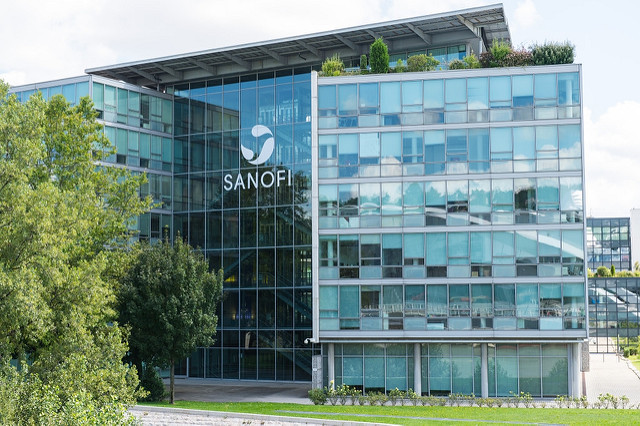
Sanofi and Regeneron Pharmaceuticals, Inc. announced positive results from the Phase 3 CAFÉ study of Dupixent® (dupilumab) in adults with moderate-to-severe atopic dermatitis (AD) who are inadequately controlled with or intolerant to the broad immunosuppressant drug cyclosporine A (CSA), or when this treatment is medically inadvisable. In the study, Dupixent with topical corticosteroids (TCS) significantly improved measures of overall disease severity, skin clearing, itching, and patient reported quality of life measures. CSA is approved for the treatment of AD in most European countries and Japan; it is not approved in the U.S. for this use. The results of this study are being presented at the European Academy of Dermatology and Venerology (EADV) Congress in Geneva, Switzerland.
The primary endpoint of the study was the proportion of patients that achieved a 75 percent or greater improvement in the Eczema Area and Severity Index (EASI-75) score at 16 weeks from baseline. EASI is a tool used to measure the extent and severity of the disease. Fifty-nine percent of patients who received Dupixent weekly with TCS, and 63 percent of patients who received Dupixent every two weeks with TCS achieved EASI-75, compared to 30 percent of those patients who received placebo with TCS (p less than 0.0001).
The mean percent change improvement in EASI from baseline at 16 weeks (a secondary endpoint) was 78 percent and 80 percent for patients who received Dupixent weekly or every two weeks with TCS, respectively, compared to 47 percent for those who received placebo plus TCS (p less than 0.0001).
“In moderate-to-severe atopic dermatitis, some patients stop cyclosporine therapy due to intolerance or lack of efficacy, or are not candidates because of other medical conditions or contraindicated medications,” said Dr. Marjolein De Bruin-Weller, Dermatologist, National Expertise Center for Atopic Dermatitis, University Medical Center Utrecht. “In the CAFÉ study, Dupixent with topical corticosteroids significantly improved overall measures of disease severity including lesions, itch, quality of life measures and symptoms of anxiety and depression in these patients. The safety profile in this study was consistent with three previous positive Dupixent Phase 3 studies in moderate-to-severe atopic dermatitis.”
Other secondary endpoints of the study included measures of the impact of Dupixent on the persistent itch caused by the disease, quality of life measures, and symptoms of anxiety and depression. The results for these secondary endpoints at 16 weeks include:
- The mean percent improvement from baseline in the intensity of patient-reported itch, as measured by the pruritus Numerical Rating Scale (NRS), was 52 percent and 54 percent in patients who received Dupixent weekly or every two weeks with TCS, respectively, compared to 25 percent for those who received placebo plus TCS (p less than 0.0001).
- The proportion of patients with a greater than or equal to four-point improvement from baseline in aspects of patient quality of life, as measured by the Dermatology Life Quality Index (DLQI), was 78 percent and 88 percent in patients who received Dupixent weekly or every two weeks with TCS, respectively, compared to 44 percent of those who received placebo plus TCS (p less than 0.0001).
- The proportion of patients with a greater than or equal to four-point improvement from baseline in the severity of their AD, as measured by the Patient Oriented Eczema Measure (POEM), a tool that quantifies the illness as experienced by the patients, was 76 percent and 83 percent in patients who received Dupixent weekly or every two weeks with TCS, respectively, compared to 42 percent for those who received placebo plus TCS (p less than 0.0001).
No new adverse events were reported in the study. The proportion of patients reporting an adverse event was similar among the treatment arms. Conjunctivitis was more frequent in patients who received Dupixent with TCS, with 16 percent and 28 percent reported in patients who received Dupixent weekly or every two weeks with TCS, respectively, compared to 11 percent for patients who received placebo with TCS. Injection site reactions were reported in 11 percent and 4 percent among patients who received DUPIXENT with TCS weekly or every two weeks, respectively, compared to 5 percent for patients who received placebo with TCS. Skin infections were reported in 4 percent and 2 percent among patients who received Dupixent weekly or every two weeks with TCS, respectively, compared to 8 percent for patients who received placebo with TCS.
A total of 325 patients in Europe were randomized into three treatment groups in the 16-week study to receive either Dupixent 300 mg weekly with TCS, Dupixent 300 mg every two weeks with TCS or placebo with TCS.
Filed Under: Drug Discovery




